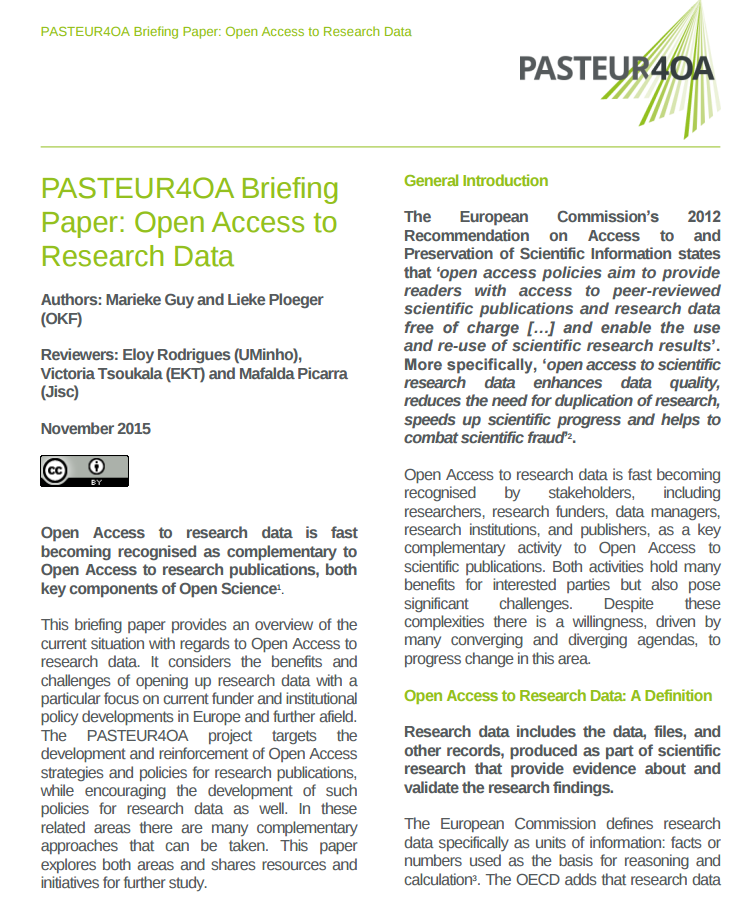German composer Felix Mendelssohn once said that “the essence of the beautiful is unity in variety“, and so there lies the challenge of the PASTEUR4OA Project.
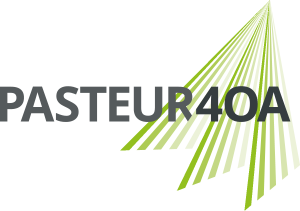
PASTEUR4OA (Open Access Policy Alignment Strategies for European Union Research) aims to support the European Commission’s Recommendation to Member States of July 2012 that they develop and implement policies to ensure Open Access to all outputs from publicly-funded research. However the state of readiness of national policymaking on Open Access across Europe is as varied as there are number of countries! PASTEUR4OA, funded by the Seventh Framework Programme for Research and Development (FP7), will help develop and/or reinforce Open Access strategies and policies at the national level and facilitate their coordination among all Member States. It will build a network of centres of expertise in Member States that will develop a coordinated and collaborative programme of activities in support of policymaking at the national level under the direction of project partners.
Open Knowledge is one of fifteen partners involved in PASTEUR4OA, the others being: the Greek National Documentation Centre (EKT/NHRF), Enabling Open Scholarship (EOS), University of Minho in Portugal, CRIStin based at the University of Oslo, Electronic Information for Libraries (EIFL), EuroCRIS, Hungarian Academy of Sciences, Polιtecnico di Torino, SPARC Europe, LIBER, Jisc, Hacettepe University, Fund for Scientific Research (F.R.S.-FNRS) and the Research Council of Lithuania.
Earlier this week (2-3 December 2014) saw the first official PASTEUR4OA workshop held at Birkbeck College, London, bringing together over 50 Open Access experts representing the majority of Europe member states.
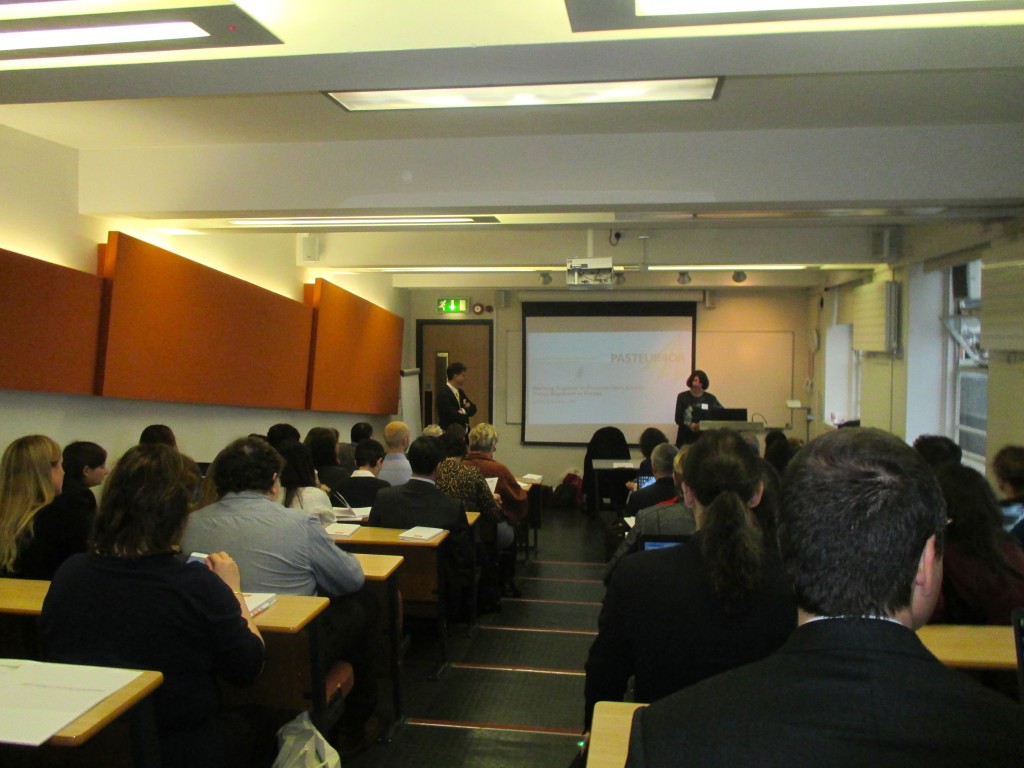
Lorraine Estelle opens the PASTEUR4OA Workshop
The Opening from Lorraine Estelle, Executive director digital resources and divisional CEO of Jisc Collections, highlighted the current complex situation in the Open Access space. Neil Jacobs, head of Scholarly communications at Jisc, then explained how PASTEUR4OA is “the start of something important for Open Access”, and also for collaboration across Europe. Jisc has been part of the Knowledge Exchange along with CSC – IT Center for Science in Finland, Denmark’s Electronic Research Library (DEFF) in Denmark, German Research Foundation (DFG) in Germany and SURF in the Netherlands for several years now and has benefited hugely from a shared approach, however PASTEUR4OA will take this communal advance to a new level.
Evidence that Europe is Leading Open Access Implementation
While those participating in the workshop are well-aware of the varying states of readiness regarding Open Access in different countries, and the need to recognise gaps in expertise, speaker Alma Swan from Enabling Open Scholarship (EOS) reminded us that Europe is still leading the way when it comes to Open Access. It is important to recognise that as part of EU Horizon 2020 Programme (H2020) we have a continent-wide Open Access policy. In H2020 there is a move from an Open Access pilot (in FP7) to an Open Access mandate – an obligation to provide Open Access papers in all research areas (green Open Access). There is also a pilot for open research data. Alma and her team have been analysing over 650 current Open Access policies across Europe and noted a number of trends. So, for example, policies work better when researchers are required to deposit any publication, regardless of the journal (subscription based or Open Access) into an Open Access repository. Timing is key here and encouraging researchers to deposit straight after acceptance of publication works best. They can deposit the paper and only expose the metadata possibly embargoing the full text until the publication date when it can be automatically opened up. Analysis also indicated that the effectiveness of policies rises when they are linked to research assessment of some sort. A form of ‘best practice’ policy is beginning to emerge that can be built on by member states. Alma talked about how there are currently there are very few policies that require Gold Open Access but some funders push are starting to push, they include RCUK, Swedish Research Council and NWO (Netherlands).
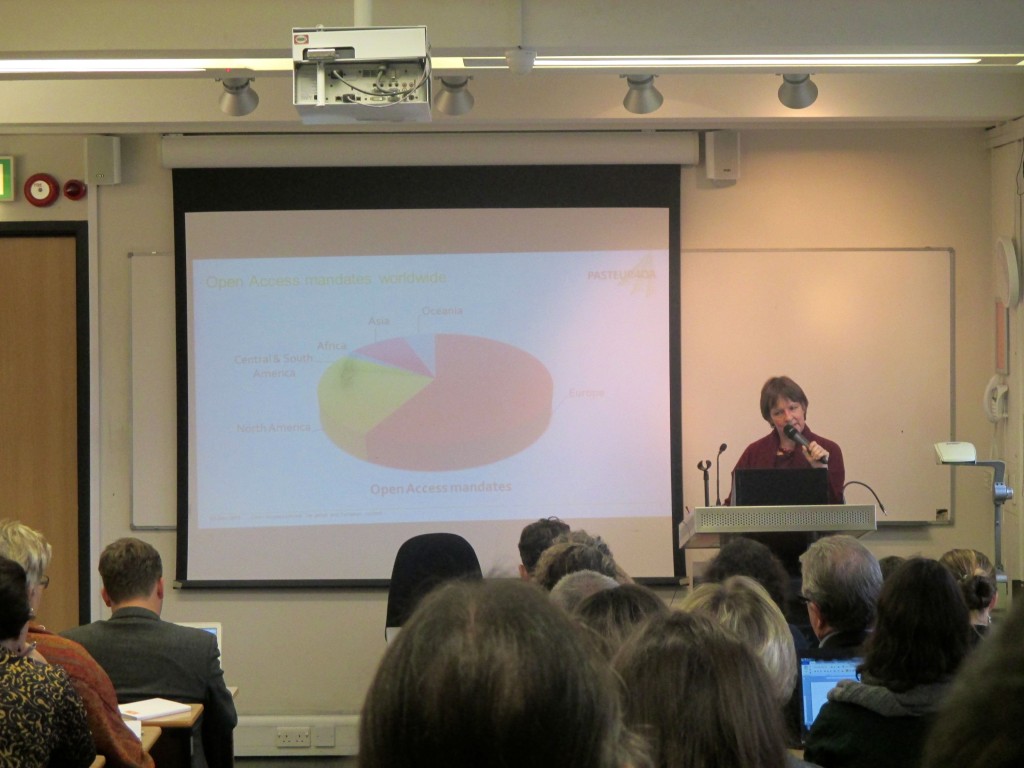
Alma Swan helping us understand what makes a good Open Access policy
Following on PASTEUR4OA project co-ordinator Victoria Tsoukala from the National Documentation Center in Greece explained how the current landscape frames the PASTEUR4OA project. One of the main aims of PASTEUR4OA is encouraging consistency between the H20202 policy and those of the Member by utisilising already existing excellent infrastructure (such as OPENAire), standards (such as CERIF Common European Research Information Format) and training support (for example through the Faciliate Open Science Training for European Research Project). However there is still much work to be done especially related to the lack of awareness and understanding, and therefore engagement, by policy-holders and in engaging with publishers.
Bringing clarity where there is diversity is a significant undertaking and PASTEUR4OA hope to achieve this through the creation of Knowledge Net: a network of national centres of expertise in Member States that can monitor and champion an aligned Open Access policy environment across the EU and in neighbouring countries. Eloy Rodrigues from the University of Minho in Portugal gave an introduction to the concept of the Knowledge Net, while the practical and legal aspects of are still being discussed it is clear to say that it will build on already existing networks (e.g. OpenAIRE NOADs, EC National Points of Reference, MedOANet Task Forces). Key nodes have already been identified and invited, and 33 organisations across Europe have now accepted to act as PASTEUR4OA Key Nodes. Their role will be to identify national policy makers, create or take advantage of Open Access working groups, develop programme of activities to engage the policy makers and generally support the project. Five regions have also been identified: the Nordic region (to be co-ordinated by Cristin), North West Europe (to be co-ordinated by EOS), East Europe (to be co-ordinated by EIFL), South East Europe (to be co-ordinated by EKT) and South West Europe (to be co-ordinated by University of Minho.
Comparing Countries
In the afternoon we were given a taste of the state of play in different countries through three inspiring case study presentations:
Niahm Brennan from Trinity College Dublin introduced the situation in Ireland, a place she described as a small country on periphery of Europe that continually “borrows best practice from other countries“. Niamh pointed out that some of the key moments in the run up to their current situation include the European Research Advisory Board Scientific Publication Policy on Open Access published in 2006 which “spoke to everyone accept researchers”, the HEA Landscape document of 2012 and the European Open Access Pilot. The events, along with the Irish financial situation which called for a need to show value for money, culminated in the Irish National Open Access Policy supported by 21 institutions. The policy doesn’t mention author-side charges – the author remains free to choose their publisher and there are no changes to publishing practices. However it recommends immediate deposit of ‘Post-print’, release as soon as possible and practical support for authors at institutional level. The policy is supported by all Irish funders and uses existing infrastructure (which is harvestable, interoperable, sustainable) including Rian.ie used by 18+ institutions. It is also means that it is easy to aggregate and discover research outputs at institutional, national and funder levels. In 2013 they were able to announce that 50% of Irish publications had been deposited in Open Access repositories! Niamh gave a nod to those from whom the Irish have borrowed including the Dutch (experts in network of repositories) and to Eurocris. She concluded by saying that that they find themselves now in a situation where they are more aware of job they have to do. They don’t currently have funds to pay gold Open Access but there is a need to keep track of Open Access activities so funders can see what they are funding. They are working towards fully comprehensive reporting, evaluation and impact analysis.
Case study two came from Nina Karlstrøm of Norway. The combination of a multitude of national infrastructure challenges (such as a railway that only reaches half-way up the country!) and a reasonably small, well educated population has resulted in a long tradition of sharing work. Norway contains a small number of large institutions alongside a large number of small institutions but remains very centralised. They have both a national CRIS and national harvester of repositories NORA. Norway is also unusual in that there is only one research funder –the National Research Council – they require that all research funded by them must be published Open Access (2009) by 6-12 months – but give no immediate deposit date. However the funder have a stick to see if articles are Open Access – they use data from CRIS to see if their policy is being followed and if not will with hold funds. In a white paper from 2012-2013 the Norwegian government states that all publicly funded research must be published Open Access and/or deposited in a repository. So while their National policy is already in alignment with the Euroopean Commission their mani challenges are in aligning Institutional policies at universities where the principle of academic freedom is strongly felt.
The third and final case study was presented by Bernard Rentier from Université de Liège, Belgium. Belgium have 3 major universities each with a repository that prevents entry of papers that are full text unless pre 2002. This was in part response to an official statement, which mandated that all publications must be full text for the publications taken into account in research assessment. Some work had to be done to avoid uploading of empty PDFs but an advocacy approach and one-to-one dialogue with researchers has proved successful. The University has been reluctant to put papers in the repositories and researchers are encouraged to always do it, the thinking behind this was that publishers were unlikely to sue researchers. Upon a suggestion by the Rector, the Université de Liège’s Administrative Board decided on May 23rd 2007 to create an open repository and bibliography for the University of Liège. The system ORBi (Open Repository and Bibliography) has been very successful despite some minor glitches when Google changed their algorythms. 1 million. In November ORBi declated 1 million downloads of the integral texts of University of Liège authors’ publications from the institutional repository since January 1, 2014. ORBi Luxembourg is now in development. Bernard concluded by saying that the in Belgium the Open Access war had to some extent been one, but that the second war of Open Access is the gold one
Note that there are already Open Access country case studies (Portugal, UK, Norway, Hungary) available on the PASTEUR4OA website. Denmark, Belgium, EuroCRIS and Ireland (being written by Open Knowledge) are likely to be published early next year.
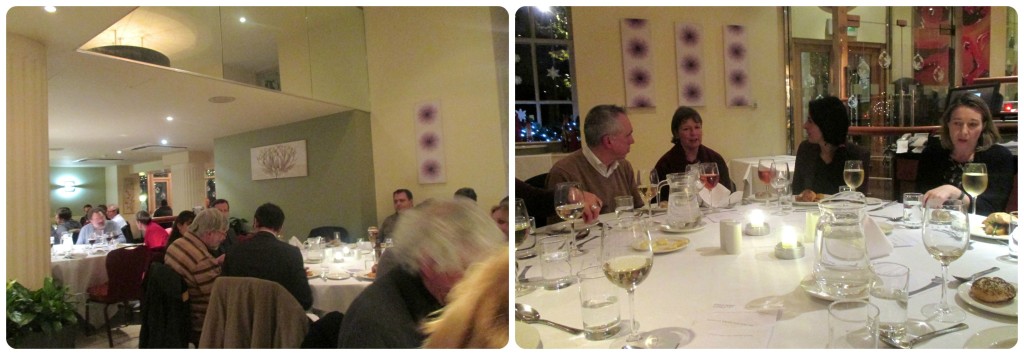
Delegates at the evening meal
Regional Group Activities
Over the course of the two days we spent time in our regional groupings identifying challenges and beginning to piece together a road map for the project. One activity involved thinking about why Open Access approaches worked in particular countries or in particular cases. Another activity involved identifying and discussing potential paths for further European collaboration in aligning, developing and implementing Open Access policies and the role of the Knowledge Net.
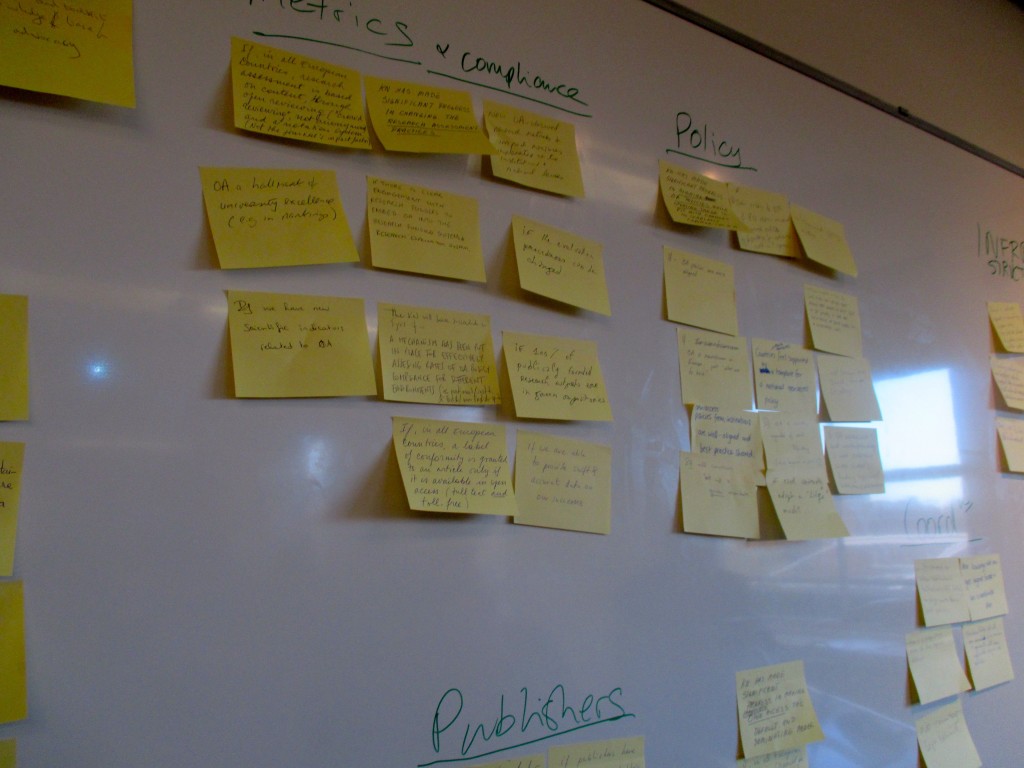
Open Access Challenges
Post-it notes aplenty when we identified the main challenges member states face in developing, implementing and aligning effective Open Access policies. The aim of the activity was to see if which of the challenges were suitable for the Knowledge Net to help with.
The main challenges fall under the following areas:
- Policy:
Lack of awareness among policy makers; Open Access to scientific information seen as low priority for policymakers; different level of progress in different member states towards policies; difficulties maintaining regular communication between stakeholders (RPOs, funders, researchers) at European level.
- Compliance:
Lack of information on policy effectiveness (in countries with policies); no appropriate systems for evaluation, monitoring, metrics and compliance testing; ensuring no country gets left behind.
- Publishers:
Lack of engagement with publishers; the need for publishers to make as money in our new Open Access system – business models.
- Infrastructure:
Availability of trusted repositories, competing with publishers on a global level; connections with open research data; connections with existing infratructure.
Effective activities were identified as:
Using the economy and monetisation as an argument; focusing on savings (e.g through using the Houghton study); involving industry; avoiding mentioning Open Access and talking about ‘visibility’ or ‘open publishing’; real-life case studies e.g. UK’s Minister for Universities and Science David Willets’ personal scholarship experiences; research rankings; connections with research assessment; advocating the dangers of not doing this; preventative menthods e.g. in the US American government employees cannot sign away copyright – a tick box in publisher forms prevents them.
Conclusions
The PASTEUR4OA 2-day event was an excellent introduction to the project and what it hopes to achieve – thanks to the Jisc team who organised the event! I was impressed by variety of nodes who had attended and the number of countries represented. It was also incredibly interesting and at times a little daunting to hear about the diversity across Europe when it comes to Open Access policies – each country has its own agenda and own culture, which will affect work in this area.
However the H2020 Open Access mandate has been delivered from above and it feels very much that now is a moment ripe for change in this area. The Key nodes across Europe are eager to receive support from PASTEUR4OA but also keen to represent their own countries identity and individuality. Developing and/or reinforce Open Access strategies and policies at the national level and facilitate their coordination among all Member States is a tall order, but PASTEUR4OA is well-equipped and ready to go!
 Open Access Working Group
Open Access Working Group 